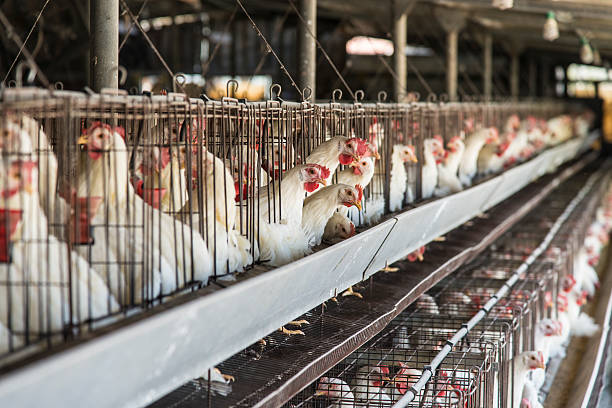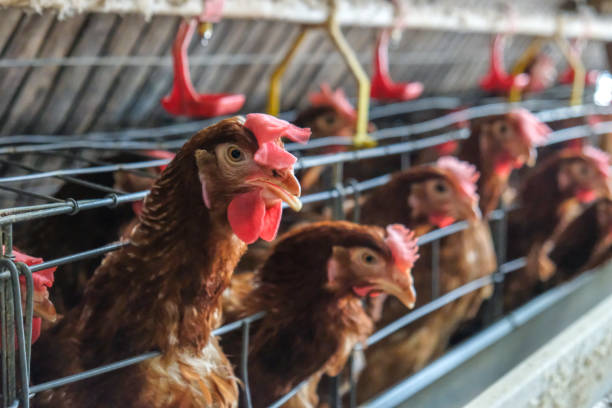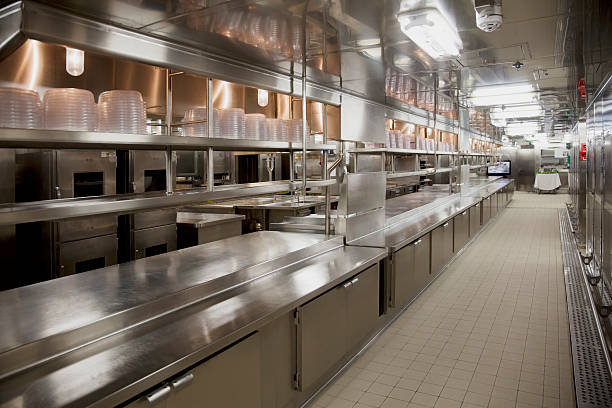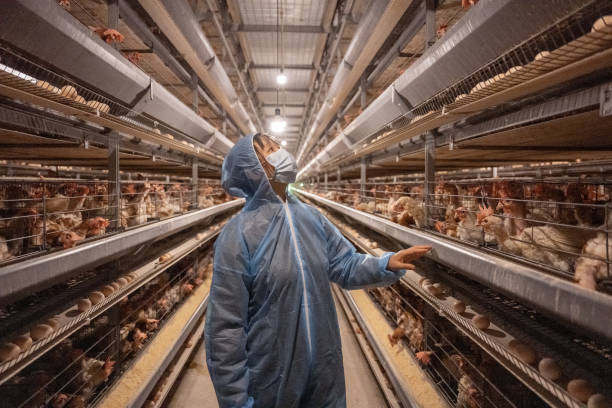
Your Guide to Top Automated Poultry Equipment Suppliers
Your Guide to Top Automated Poultry Equipment Suppliers
The world of poultry farming has undergone a monumental transformation in recent years, largely thanks to the evolution of automated poultry equipment. These innovative solutions have revolutionized how farmers manage their flocks, significantly improving efficiency, reducing labor costs, and ultimately boosting profitability. Whether you are a seasoned poultry farmer or just starting out, selecting the right equipment supplier is a critical decision that can make or break your operation. This guide will walk you through the key considerations when choosing top automated poultry equipment suppliers, offering insights into what makes a supplier stand out and how to ensure you’re making the best investment for your farm.
Why Automation is Key for Modern Poultry Farming
Before diving into how to choose a supplier, let’s first understand why automated poultry equipment is no longer a luxury, but a necessity for competitive and sustainable poultry farming.
Increased Efficiency: Automation streamlines various processes, such as feeding, watering, egg collection, and manure removal, reducing the time and labor required for daily tasks. This allows farmers to manage larger flocks with fewer employees.
Improved Bird Health and Welfare: Automated systems can maintain consistent environmental conditions, including temperature, humidity, and ventilation, leading to healthier and more productive birds. Precise control reduces stress and the risk of disease outbreaks.
Reduced Labor Costs: Labor is one of the most significant expenses in poultry farming. Automation significantly reduces the number of manual tasks, lowering labor costs and freeing up valuable resources for other aspects of the business.
Enhanced Productivity: Automated systems optimize resource utilization, ensuring birds receive the right amount of feed and water at the right time. This leads to improved growth rates, higher egg production, and better overall performance.
Data-Driven Insights: Many automated systems come equipped with sensors and data analytics capabilities. This real-time data helps farmers monitor flock performance, identify potential problems early, and make informed decisions to optimize their operation.
Better Biosecurity: Automated systems reduce the need for human intervention within the poultry house, therefore minimizing the risk of introducing diseases from external sources, ultimately resulting in better biosecurity for the flock.
Key Factors to Consider When Choosing a Supplier

Selecting the right automated poultry equipment supplier involves careful evaluation of several factors. Here are some essential considerations:
Product Range and Quality:
Variety of Equipment: A good supplier should offer a comprehensive range of automated equipment, including feeding systems, watering systems, climate control systems, egg collection systems, manure removal systems, and more.
Equipment Quality: The quality of the equipment is paramount. Look for suppliers that use durable materials, employ robust manufacturing processes, and adhere to industry standards. High-quality equipment translates to longevity, reliability, and reduced maintenance.
Technology and Innovation: Choose suppliers that are at the forefront of technological innovation. They should be offering cutting-edge solutions with advanced features, smart controls, and data analytics capabilities.
Customization and Scalability:
Custom Solutions: Every poultry farm is unique, with different needs and requirements. The best suppliers will offer custom solutions that are tailored to the specific size, layout, and operational goals of your farm.
Scalability: As your farm grows, your equipment needs will evolve. Select a supplier that offers scalable solutions that can be easily expanded or upgraded to accommodate your growing operation.
Experience and Reputation:
Industry Experience: Look for suppliers with extensive experience in the poultry industry. They should have a deep understanding of the challenges and opportunities facing poultry farmers.
Reputation and References: Check the supplier’s reputation by reading online reviews, talking to other poultry farmers, and requesting references. A reputable supplier will have a track record of satisfied customers and successful installations.
Installation and Training:
Professional Installation: Proper installation is critical for the performance and longevity of automated equipment. Ensure that the supplier offers professional installation services performed by qualified technicians.
Comprehensive Training: The supplier should provide thorough training to you and your staff on how to operate, maintain, and troubleshoot the equipment. Effective training will empower you to maximize the benefits of automation.
After-Sales Service and Support:
Technical Support: Automated equipment may occasionally require maintenance or repairs. A reliable supplier should offer timely and responsive technical support to address any issues that may arise.
Spare Parts Availability: Ensure that the supplier maintains an adequate inventory of spare parts. The availability of spare parts will minimize downtime and keep your operation running smoothly.
Maintenance Services: Some suppliers offer preventative maintenance services to ensure that your equipment operates at peak performance. Consider choosing a supplier that offers these services.
Cost and Financing Options:
Competitive Pricing: While quality should be the primary consideration, it’s also essential to compare pricing among different suppliers. Look for suppliers that offer competitive pricing without compromising on quality.
Financing Options: Automated poultry equipment can be a significant investment. Some suppliers offer financing options or partner with financial institutions to help you manage the cost.
Top Automated Poultry Equipment Suppliers: What Makes Them Stand Out?
So, what qualities distinguish the top automated poultry equipment suppliers from the rest? Here’s a closer look at the key attributes:
Innovation and Technology Leadership: The best suppliers are constantly innovating, developing new and improved solutions that address the evolving needs of poultry farmers. They invest heavily in research and development and stay ahead of the curve in terms of technology trends.
Customer-Centric Approach: Top suppliers prioritize customer satisfaction. They take the time to understand your specific needs and provide personalized solutions that meet your unique requirements. They are responsive, helpful, and committed to building long-term relationships with their customers.
Comprehensive Solutions: The leading suppliers offer end-to-end solutions, from planning and design to installation, training, and ongoing support. They act as a trusted partner, guiding you through every step of the automation process.
Commitment to Sustainability: Sustainable practices are increasingly important in poultry farming. The best suppliers are committed to developing eco-friendly solutions that minimize environmental impact and promote animal welfare.
Global Reach and Local Presence: Many of the top suppliers have a global presence, with operations and support networks around the world. This ensures that you can receive timely assistance and support regardless of your location. However, a local presence is also crucial for installation and after-sales support.
Strong Warranties and Guarantees: Confidence in their product quality is reflected in the warranties and guarantees offered. Suppliers with robust warranties demonstrate their commitment to the reliability and longevity of their equipment.
The Importance of a Site Visit and Consultation
Before making a final decision, it is highly recommended to visit the supplier’s facilities and speak with their experts.
Factory Tour: A visit to the supplier’s manufacturing plant can provide valuable insights into their production processes, quality control measures, and technological capabilities.
Demonstration and Testing: Ask for a demonstration of the equipment you are interested in. This will allow you to see it in action and evaluate its performance.
Consultation with Experts: Schedule a consultation with the supplier’s engineers and technical experts. Discuss your specific needs and requirements, and ask for their recommendations on the best solutions for your farm.
Avoiding Common Pitfalls When Choosing a Supplier
Selecting the right supplier is crucial, and avoiding common mistakes can save you time, money, and headaches. Here are some pitfalls to watch out for:
Focusing Solely on Price: While cost is a factor, it should not be the only consideration. Choosing the cheapest option may ultimately lead to lower quality, unreliable performance, and higher maintenance costs in the long run.
Ignoring Customer Reviews: Neglecting to research customer reviews and testimonials can be a costly mistake. Pay attention to what other poultry farmers are saying about their experiences with different suppliers.
Failing to Ask Questions: Don’t hesitate to ask the supplier detailed questions about their equipment, services, and support. Clarify any doubts or concerns before making a decision.
Overlooking Training: Proper training is essential for operating and maintaining automated equipment. Don’t underestimate the importance of comprehensive training programs.
Neglecting After-Sales Support: After-sales support is just as important as the initial purchase. Ensure that the supplier offers reliable technical support, spare parts availability, and maintenance services.
Not Verifying Certifications and Standards: Confirm that the supplier’s equipment meets relevant industry certifications and standards. This ensures that the equipment is safe, reliable, and compliant with regulations.
The Future of Automated Poultry Farming

Automated poultry farming is poised for continued growth and innovation. As technology advances, we can expect to see even more sophisticated and efficient solutions that further optimize poultry production. Key trends to watch include:
Artificial Intelligence (AI): AI is being used to analyze data from sensors and optimize various aspects of poultry farming, such as feeding, climate control, and disease detection.
Internet of Things (IoT): IoT devices are connecting poultry equipment and enabling real-time monitoring and remote control.
Robotics: Robots are being deployed to automate tasks such as egg collection, cleaning, and sorting.
Data Analytics: Advanced data analytics platforms are providing farmers with valuable insights into flock performance, enabling them to make data-driven decisions.
Sustainable Solutions: There is a growing focus on developing sustainable poultry farming practices that minimize environmental impact and promote animal welfare.
Conclusion

Choosing the right automated poultry equipment supplier is a critical decision that can significantly impact the success of your poultry farming operation. By carefully considering the factors discussed in this guide, you can make an informed decision and select a supplier that will be a trusted partner in your journey towards efficient, sustainable, and profitable poultry production. From product quality and customization options to experience, reputation, after-sales service, and cost, each aspect plays a vital role in ensuring you’re investing in a solution that will benefit your farm for years to come. Remember to ask questions, seek references, and, if possible, visit the supplier’s facilities to see their operations firsthand. Embrace automation, choose your supplier wisely, and unlock the full potential of your poultry farm.
